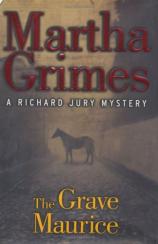Interview: September 6, 2002
September 6, 2002
Martha Grimes is the author of seventeen Richard Jury novels, as well as the novella THE TRAIN NOW DEPARTING, and the Spirit Lake trilogy --- COLD FLAT JUNCTION, HOTEL PARADISE, and THE END OF THE PIER. In this interview with Bookreporter.com's Ann Bruns, Ms. Grimes gives readers an even deeper insight into what sparks her imagination and motivates her characterizations.
BRC: The storyline of THE GRAVE MAURICE unfolds through the collective eyes of Melrose and Jury, along with other key characters: Nell, Maurice, Vernon, and --- most intriguingly of all --- the horses. What inspired you to intertwine the voices of your human characters and the thoroughbreds?
MG: What inspired me to include the point of view of some of the horses was, for one thing, a hedge against sentimentality --- something I only manage to just skirt on occasion. In this case, Samarkand's real put-down thoughts to Maurice's drooling love (well, I guess he's not that sentimental) are the horse's responses, like "Your day," et al. Then, of course, there are Aggrieved's thoughts about Melrose. This was just my sense of one-upmanship, I suppose. Melrose never quite seems to make it with the animal world. But another reason for the horse intrusion is because the book deals very seriously with the abusive treatment of some of the horses and I was trying to make the horses a little more human.
BRC: When asked about your approach to writing, you've responded that your novels are created from images, not plot outlines. Whose image first came to mind for THE GRAVE MAURICE?
MG: The image that "inspired" this book was the one at the very beginning: "The pale horse. . ." Oddly enough, I got this from Proust. I thought this was what I read, but when I went back to check, Marcel hadn't said this at all. It was the pale something-else, "house" possibly. Funny to write a whole book based on a misapprehension. (Well, of course, there were other things that came along.)
BRC: While recuperating in the hospital Jury is drawn into investigating the disappearance of his doctor's daughter, Nell, who vanished two years ago. Despite the good doctor's expressions of parental anguish, he nearly drops out of the storyline once he signs Jury's medical release. Did you deliberately relegate him to the background to emphasize the sense of abandonment that Nell must have felt living apart from her father?
MG: I wish I'd had a good reason for shoving Roger into the background; it happened simply because there wasn't time and space for him and he didn't seem to have a great deal of impact on the story anyway, beyond getting Jury interested. It's not a good reason for leaving him out, but that's what happened.
BRC: Jury revisits the children from your previous novel, THE BLUE LAST, and makes the observation that each has chosen to continue their individual living arrangements because people "... get used to a certain way of --- being, and it's not always a good thing to change it." Is this also a hint that Jury has reached a level of contentment with his own life?
MG: Jury intuited this about Benny's reaction to living with the family; of course, he did generalize it, but I doubt that he's becoming more content with his own life. The right woman would probably help to cure him of that.
BRC: Nell's kidnapping evolves into something much more horrific when she stumbles onto the truth about the cruelties behind the operation of a "horse urine" mill. I'm predicting THE GRAVE MAURICE is going to come as a shock for more than a few of your female readers --- it certainly stopped me cold when I read the name Premarin. How did you come upon this information about the manufacture of Premarin, and where can women go to learn more?
MG: I went to L.A. to lend my support to an animal-rights group called Last Chance for Animals. I've long been a supporter; they do very good work. On my way out of the office, I saw a bunch of folders sporting a beautiful horse and foal on the front. When I read about this hormone replacement therapy and its devastating effects on mares and foals I was absolutely stunned. As it happened, I had already been writing THE GRAVE MAURICE, and since I was dealing with a stud farm and horses anyway, the whole Premarin issue fit right in. In other words, I did not begin with this issue --- although I imagine I'll be accused of preaching.
I've got an email address if you want to get more information: campaigns@lcanimal.org I can only say I hope this does come as a shock to a lot of women who've been more or less conned into believing they need this sort of therapy. (Some probably do, but certainly not all of the women who are taking it. Can you believe that these "horse farms" have been around for 50 years and yet have never been widely known of?
BRC: Melrose and Jury both sense that despite a common background of tragedy and a love of horses, it's the differences between Nell and Maurice that are significant --- a prophetic thought, as it turns out. In your view, is strength of character, or the lack of it, the key element that all great human dramas turn upon?
MG: I think it's courage (which might be synonymous with character); I also think it's focus. Focus is very important to me (who doesn't have it). This leads into your last question. Nell Ryder is another Carrie Fleet, no doubt about it. Nell simply burns away any extraneous matter --- which causes Vernon (to his surprise, I'm sure) to realize she can be ruthless. She doesn't give much of a damn about putting people out of work. She has one object --- save those mares. (But she is also very human; she's in love with Vern but thinks it's all in vain given the difference in their ages.)
BRC: THE GRAVE MAURICE features Melrose conducting his usual undercover investigation on Jury's behalf, and he predictably goes off the deep end, buying a horse. Is this compulsion for always getting himself in these comical fixes what makes his character so appealing to write?
MG: Yes, absolutely. Melrose and his "ornamental hermit." Writing scenes like this makes me one stop short of hysterical. Once I fell off the bed. Unfortunately, a number of reviewers don't share my enthusiasm for Melrose --- and by extension the Long Pidd gang in the Jack and Hammer. Of course, people often don't see the connection between scenes like the hunt that Melrose and friends go to, and accuse me of tossing in irrelevancies. Huh? There's no connection between the hunt subplot and the main story???
BRC: Jury has a fling with yet another femme fatale and he proffers his theory about love at first sight. Given the number of times Jury has admittedly "fallen in love," won't readers view this as some stereotypical male rationale --- confusing lust with love?
MG: Well, I can see where readers might, but they never have. And actually I go along with RJ. It's really love. He's of a mind that one can fall in love at first sight. Jury's an incredible romantic.
BRC: At one point in their investigative travels, Plant and Jury take a wistful walk through the remains of The Man With A Load of Mischief --- the pub that lent it's name to your first Jury novel --- and Melrose ponders the idea of buying and restoring it. Is he echoing some wishful thoughts of your own along that same line?
MG: No, I have no wish to open a pub. Jury comes up with some very good reasons not to.
BRC: In a previous interview you mentioned the possibility of a Jury series being developed for British television. Has there been any progress made in those discussions?
MG: Unfortunately, the TV series has come and gone. Or rather, it was gone before it came. A very sore point with me because I was sure it was really going to happen.
BRC: Can you tell us anything about your next novel? Will it be another Jury? Another Spirit Lake?
MG: The novel I'm writing now is something completely different (as Monty Python was fond of saying). However, the one after that will be another Jury novel. And the one after that will be either another of the Spirit Lake books or a sequel to BITING THE MOON (i.e., another animal-welfare theme).
BRC: One final thought --- Nell is characterized as having an elusive quality about her that is difficult to describe; an ethereal essence that, one way or another, always seems to remain just out of everyone's grasp. I was reminded of your comments in the COLD FLAT JUNCTION interview: "Who is this Girl? It beats me. I think the Girl is the same "girl" who appears in BITING THE MOON. I think she's also Carrie Fleet in THE DEER LEAP. I think her coming back again and again is very, very, very strange." Do you think it's the search for an answer to that question that keeps compelling you to write the next novel? Do you think you'll ever find an answer?
MG: "The Girl", Carrie Fleet, Nell Ryder, Andi (in BITING THE MOON) are all spun from the same cloth and, as I said, I do indeed find it very strange. It's a compulsion to write about this "girl". The story of Emma will probably never be finished until she figures out who this girl is. Will that question ever be answered? Yes, I think so. But I think your comment that this person always seems to "remain just out of everyone's grasp" is a very good way of putting it.




